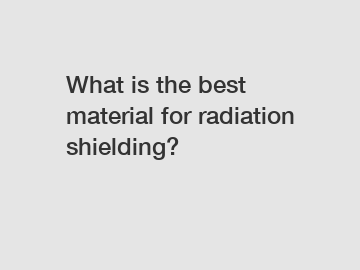What is the best material for radiation shielding?
texcraf Product Page
What is the best material for radiation shielding?
Radiation shielding is vital in industries such as medicine, nuclear power generation, and aerospace, where workers may be exposed to harmful radiation. Shielding materials help protect individuals from the potentially harmful effects of radiation by absorbing or blocking the radiation energy. Various materials possess radiation shielding properties, but it is essential to find the best material that meets the specific requirements of the industry. In this article, we will explore different types of radiation shielding materials and determine which one is the best.

Lead Shielding:
Lead is one of the most commonly used materials for radiation shielding. Its high atomic number (82) and density make it an effective choice for blocking or absorbing radiation. Lead effectively attenuates gamma rays and x-rays, providing excellent shielding properties. It is particularly useful in medical applications like X-ray rooms, CT scans, and radiation therapy rooms. However, lead has its drawbacks. It is toxic, which creates a handling and disposal challenge. Additionally, lead is heavy and difficult to work with, making it less suitable for applications in which weight is a primary concern.
Concrete Shielding:
Concrete is a versatile and cost-effective material that offers good radiation shielding. It is often used in construction for nuclear power plants, research reactor facilities, and other radiation-related industries. Concrete's primary radiation shielding mechanism is through its high density and atomic number. It effectively attenuates gamma rays and can provide sufficient shielding in many situations. Concrete is beneficial as it is readily available, easy to shape, and requires no special handling precautions. However, it may not be an ideal solution for applications that require more precise shielding requirements due to limitations in its attenuation properties.
Water Shielding:
Water is another material commonly used for radiation shielding, especially in nuclear power plants. It is readily available and offers excellent gamma ray attenuation properties due to its dense and hydrogen-rich composition. Water also acts as a coolant, making it an effective shield against both radiation and heat. However, water may not be suitable for all applications, particularly in situations where weight or portability is a concern.
Boron-Based Shielding:
Boron is commonly used in radiation shielding due to its high neutron absorption capability. It is often combined with other materials to produce effective shielding against specific types of radiation. Boron-loaded polyethylene, for example, is a lightweight and efficient material for neutron shielding, making it suitable for applications such as nuclear reactors and medical neutron therapy facilities. However, boron-based shielding may not be as effective against other types of radiation, such as gamma rays or x-rays.
Hybrid Shielding Materials:
In some cases, a combination of materials may be used to achieve the best radiation shielding properties. For instance, lead and concrete are often used together to create a more effective shield against various types of radiation. Hybrid shielding materials allow for customization and optimization of shielding properties to meet specific requirements.
Conclusion:
The choice of the best material for radiation shielding depends on factors such as the type of radiation to be shielded, the desired level of attenuation, weight limitations, and specific industry requirements. While lead, concrete, water, boron-based materials, and hybrid options all offer various advantages and disadvantages, each may be suitable in different applications. It is recommended to consult with radiation shielding experts to determine the best material that meets your specific needs.
If you require more information or assistance in selecting the right radiation shielding material, please feel free to contact us. Our team of experts will be happy to help you make an informed decision.
If you are looking for more details, kindly visit our website.
Are you interested in learning more about custom silver coating conductive fabric supplier? Contact us today to secure an expert consultation!



